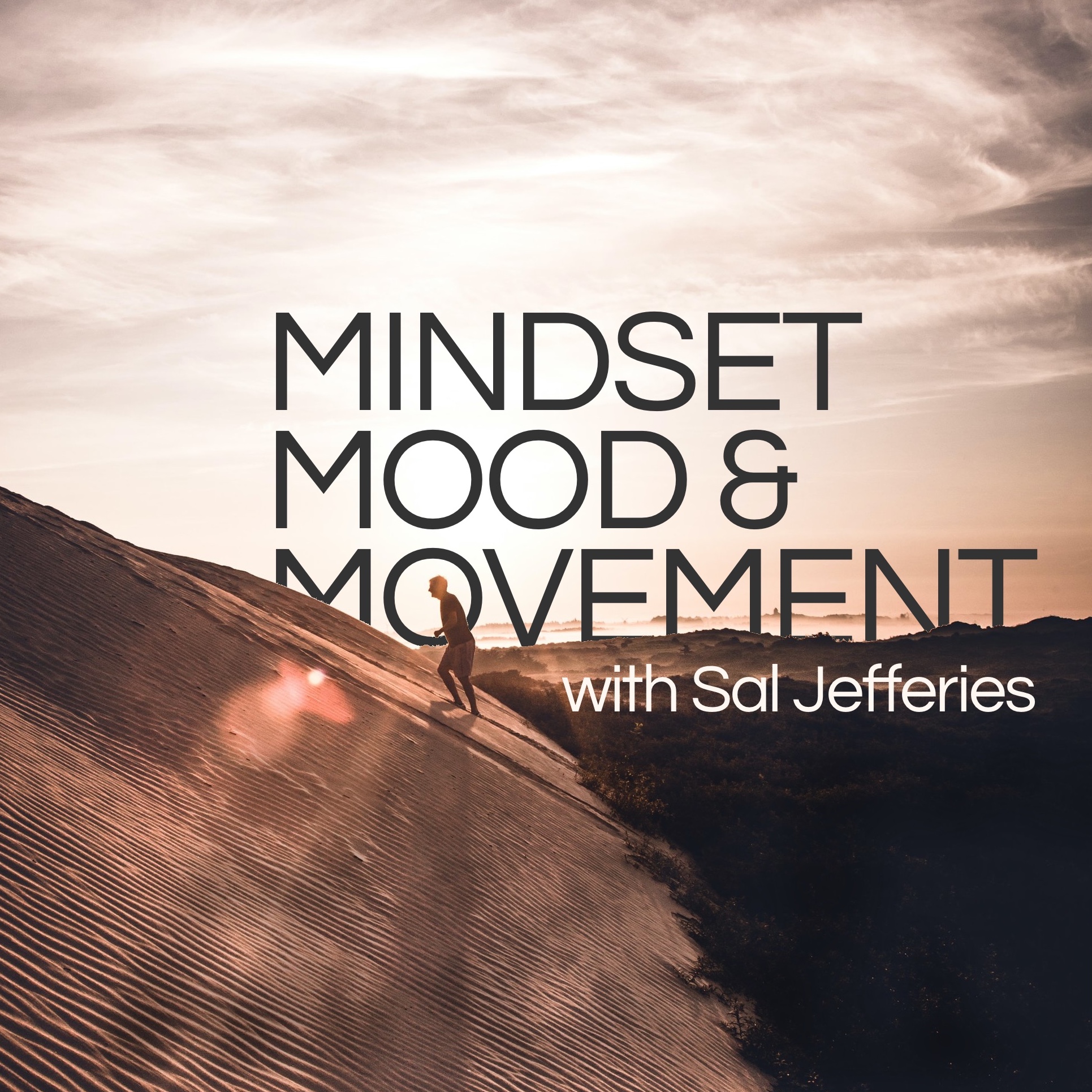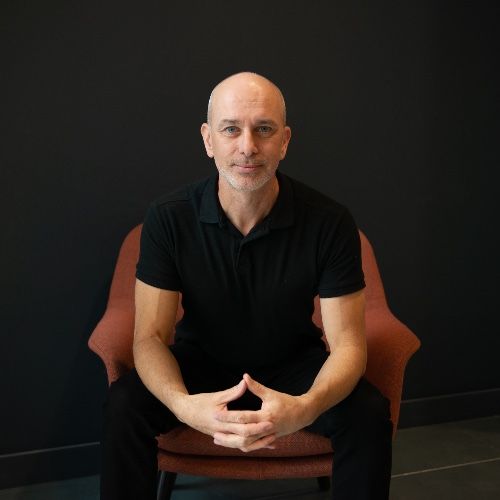Episode 2
Why working with a person as an ecosystem is a powerful approach to self development
When we view ourself as an ecosystem, we see how the whole system works, interacts and affects each other. More importantly, this allows people to make significant changes that go way deeper and create more impact in life and work.
I use a unique approach to personal development that works with the mind, mood and movement together. In this short episode, I explain this approach and process with examples.
If you're stuck, stressed, exhausted and ready to changes this might show you a new way...
Get in touch with Sal
If this episode has caught your attention and you wish to learn more, then please contact me. I offer a free 20 min call where we can discuss a challenge your facing and how I may be able to help you.
Transcript
Welcome to Mindset, mood and Movement, a systemic approach to human
Sal Jefferies:behavior, performance, and wellbeing.
Sal Jefferies:How psychological, emotional, and physical health are all connected.
Sal Jefferies:In this episode, I'll be sharing my knowledge and experience to help
Sal Jefferies:you overcome a challenge that you might be facing in life health.
Sal Jefferies:All work.
Sal:Hello and welcome.
Sal:Today's episode is a bit more of an education.
Sal:I guess you could say about me, my philosophy, the work that I do and
Sal:how it impacts the people I work with.
Sal:So as you've probably guessed from the podcast name, Mindset, Mood and
Sal:Movement, they are the spaces I work with.
Sal:Um, but it could sound a bit weird and esoteric and you may not know.
Sal:So I want to expand this.
Sal:One of the things I want to share is that our world, whether we
Sal:see it or not is really a lot of specialism, a lot of fragmentation.
Sal:We've got people who might work on the body, say a physio.
Sal:If you have a physical problem, you might have a need to see a
Sal:doctor if you're not feeling well.
Sal:You might think, well, gosh, I'm, I'm really struggling.
Sal:I'll, I'll go see a therapist to help me.
Sal:Um, what we've got is we've got these specialized fields and
Sal:there's a place for them, but we've got these specialized fields that
Sal:often don't talk to each other.
Sal:They're not connected.
Sal:They, they, they're working in the silos.
Sal:And what I see is that this doesn't really serve people that well
Sal:when we're working on growth.
Sal:Personal development and and all the stuff that makes us being a human being how we
Sal:think how we feel and what's happening in our body And this is the premise
Sal:that that I've been working with now You most of us are used to the I guess
Sal:the description of ecosystems with our current climate crisis Every day, we're
Sal:hearing about ecology and ecosystems breaking down and these sorts of things
Sal:And I guess I really, it's easy to think about ecosystems being as trees and
Sal:plants and rivers and nature and so forth.
Sal:But what I see is that our human system, you, me, everyone, we are
Sal:actually an ecosystem of ourself.
Sal:So we have our mind, all the think, thought, all that inner stuff.
Sal:We have our mood, our emotions, our feelings, our sensations, and
Sal:that then blends into our body.
Sal:So how we move, how we're living, how we're acting, how we're moving.
Sal:And these three elements are what I find fascinating to
Sal:look at them as one ecosystem.
Sal:Now, when we think about mind, let's elaborate.
Sal:So mind is all the stuff that's going on with him.
Sal:It's how you think it's the stuff you say to yourself in your own mind.
Sal:It's your belief structure.
Sal:It's who you say you are, your personality, um, it's your
Sal:fears, it's your backstory.
Sal:It's all that psychological, uh, structure.
Sal:And we all have it.
Sal:Some of us have got elements of it that need work.
Sal:Some of us have got things that we can grow into, but that's a really big part
Sal:of, of one system, the mind system.
Sal:When I talk about mood, we're talking about affect is a technical word
Sal:for regular, for emotion and affect regulation, regulating emotions.
Sal:And emotions are.
Sal:We can cross them over from the mind into the body.
Sal:So we've got how we feel about something, but they're all built on
Sal:chemicals, chemical messengers and signals and stuff around our body.
Sal:And our mood is a really fundamental quality and experience that
Sal:tells us how we're doing in life.
Sal:Whether you're feeling happy, sad, stressed, fearful, whatever
Sal:that is, there's an emotional charge to our thinking.
Sal:So we have the emotional layer and then we have a physical.
Sal:You know, a physical body itself.
Sal:How well do you feel?
Sal:How much energy do you have?
Sal:How strong are you?
Sal:How fit are you?
Sal:Uh, how many aches and pains have you got?
Sal:All the things that we, we all experienced a different degree.
Sal:And can that be worked on?
Sal:Can that be changed?
Sal:And then the question is how is that physical structure creating an
Sal:experience in our emotional structure?
Sal:So is our body in a way that's helping our emotions be well
Sal:or not or regulated or not?
Sal:And then how does that affect our mind?
Sal:The eye, the personality.
Sal:So when we look at mind, mood and movement.
Sal:And we look at the links.
Sal:We can think of this as like a Venn diagram with the circles overlaying.
Sal:They can be looked at in separate spaces.
Sal:But we need to look at the connection and there is so much
Sal:power when we look at the three.
Sal:And to give you an example, um, how this came about.
Sal:So I worked in, I've done a lot of different things.
Sal:I've had business for 20 years or so.
Sal:I've done lots of different things, but in the last decade, decade and a half.
Sal:Uh, yoga was a big part of my life and I was teaching yoga, like a lot, maybe
Sal:four or five classes a day and private clients and lots and lots of stuff.
Sal:And I'd work with people and they'd come to my practice and we'd do a lot of
Sal:physical work and I'd see great change.
Sal:I'd see their facial muscles relaxed.
Sal:I'd see their body change and become more supple and become stronger.
Sal:And they'd normally leave the studio, uh, feeling great and they'd come
Sal:back the next week looking stressed.
Sal:I'm like, wow, did you not, could you not take some of this forward?
Sal:Um, but then of course on speaking to people deeper, what I found was so much
Sal:of what was going on was in the mind.
Sal:So the yoga practice was brilliant.
Sal:It was helping in a large extent, but it wasn't the totality.
Sal:There was some stuff missing in how people saw the world.
Sal:How they thought about themselves, how they dealt with problems and
Sal:pressures and that sort of thing.
Sal:And some years later I then got involved in psychotherapy.
Sal:It drew me and I did an amazing postgrad in contemporary psychotherapy.
Sal:And that led me on the path of the mind and perhaps more into the emotional space.
Sal:So I set up practice and was working in that for a good few years.
Sal:And what I'd see is that we work on stuff, people come in with anxiety, they come
Sal:up with stress, come up with, pains and traumas that needed healing of some kind.
Sal:And we wouldn't necessarily talk about the body.
Sal:We wouldn't necessarily get movement involved so much.
Sal:We wouldn't look at how the, the, the two were related.
Sal:We did a lot of talk and think, work, but we wouldn't really go into the
Sal:physical, like the actual movement and creating a program around that.
Sal:So over the years I've been looking at how these things weave together.
Sal:Now let's segue into a little personal story.
Sal:, in terms of my mind, I used to be all over the place.
Sal:And really struggle with, how I thought about myself, what I believed,
Sal:all this, uh, internal narrative.
Sal:And then the more I looked at how that internal narrative
Sal:was, whether it was doubt.
Sal:, whether it was, low self esteem, the, these kinds of things that was
Sal:happening for me, imposter syndrome, I've had the law, basically working
Sal:through them started to change how I fell, hence the emotional realm,
Sal:but also started to change how I felt about my body and how I would move.
Sal:And then, when we look at the emotional side, so another piece of this, which
Sal:changed my world was getting into yoga and then breath work, because as I started
Sal:to learn about how breathing affects us, how breathing directly affects.
Sal:The, uh, the conversation in the autonomic nervous system, like what the body and
Sal:the brain are talking to each other.
Sal:Then I started to understand I could change my mood by using things like
Sal:breath work and yoga to some degree.
Sal:And that changed how I was thinking.
Sal:So I started getting more and more interested in this
Sal:weave of thinking and feeling.
Sal:And then I got into yoga big time, really got into a lot of movement and
Sal:I hadn't been doing this years before.
Sal:I've been in a photographer for many years.
Sal:I got really into the body and movement of all different natures.
Sal:And, and I started to see how that was affecting how I felt, how I thought.
Sal:And then I took that further on and went to strength and conditioning work and
Sal:the whole palette of physical movement to see how they all come together.
Sal:Now, what I found over the years, and this is a personal story, is that, so much is.
Sal:built on misunderstanding.
Sal:So I have an autoimmune condition and this autoimmune condition is, you could
Sal:look at it as a medical condition.
Sal:And that's often what it's called.
Sal:, it's called ulcerative colitis in the medical community.
Sal:We'd call it inflammatory bowel disease.
Sal:It doesn't work for me because I understand how things work together.
Sal:So yes, I have a specialist.
Sal:mostly I'm in what's called in remission and things are pretty good,
Sal:but this whole physical expression of the autoimmune condition.
Sal:isn't physical only.
Sal:Now, when I was looking at work from people like Gabor Maté
Sal:who's done loads of it, decided to look at its origins.
Sal:Like where did this start?
Sal:How did my immune system learn that it needs to attack itself?
Sal:That's a crude analogy, but it's what we say in autoimmune.
Sal:And it all started back in a traumatic event when I was a
Sal:teenager in a very difficult time.
Sal:And, and the therapeutic work helped me track that back to
Sal:that place when I felt helpless.
Sal:When I had no other option and when I, of course, I didn't know, but my
Sal:nervous system decided to encode that as a traumatic experience, one where
Sal:I had no choices and I had to freeze.
Sal:And that was the start of this autoimmune condition.
Sal:Now there's a lot of stuff around this.
Sal:There's a theory, so we need to be careful and I would never suggest that
Sal:you don't have a medical professional.
Sal:But what I do invite you to do, this is an example that's mine and it's worth
Sal:looking at how the physical expression of this disease or this ease, was built
Sal:on a psychological, emotional platform.
Sal:And now I've dealt with the physical through health, fitness, uh, nutrition.
Sal:Uh, I've also dealt with it from psychological, emotional,
Sal:generally, I'm in a very good state.
Sal:So this is the interesting thing that interests me about how we
Sal:can look at these places together.
Sal:Another example, again, I'll keep it very personal.
Sal:So it's undeniable.
Sal:I used to have a lot of anxiety and struggle with, uh, you know,
Sal:really worrying about things and really anxious and hyper.
Sal:And I just didn't realize that I was also dysregulated.
Sal:I was mouth breathing.
Sal:Uh, I was chest breathing and learning about how, if we breathe
Sal:through the nose and diaphragm and all these effects from the physical
Sal:effect of breathing affects our mood.
Sal:Studying things like polyvagal theory by Steven Porges helped me understand
Sal:that if we are dysregulated, i.
Sal:e.
Sal:the nervous system's in a stress response or a shutdown response, and you can't
Sal:move out of it, Then of course your thinking is going to be one of, uh, I'm
Sal:not safe, I am uncertain, I feel anxious.
Sal:So by working on the breathwork side and the body side that came to that, could I
Sal:start to then understand that my anxiety situation needed the emotional regulation,
Sal:it needed things like breathwork, and needed my body to function well.
Sal:So that my mind could regulate the thinking as much as my body
Sal:could regulate the emotions.
Sal:So that's a really, really showed me so much about those connections.
Sal:And then physical.
Sal:Well, um, I'm not a young person anymore.
Sal:I'm north of 50.
Sal:I train pretty much most days and I do heavyweight training,
Sal:sprint training, plyometrics.
Sal:I do lots of sport and And this hasn't always been like this.
Sal:It's taken quite a long way to be able to get to this, this level.
Sal:And it's, it's an ongoing process.
Sal:But what I've found is that as a midlife adult, my body is stronger,
Sal:my muscles work well, my connective tissues are feeling robust.
Sal:Obviously I still do yogas that keeps you very subtle and mobile.
Sal:And all of this physical, let's say shape and structure of the body is allowing
Sal:me to think and feel in a different way.
Sal:It's nothing worse than your aches and pains where you feel
Sal:tired and you don't have energy.
Sal:And boy, if you run a business, you don't want any of that
Sal:because it's just draining.
Sal:So it's not about some utopium, like it's a perfect place, but understanding
Sal:these pieces, mind, how it affects us, mood and what we can do, and worldview.
Sal:We are an ecosystem.
Sal:So if we want change, we want confidence, we want to overcome
Sal:anxiety, problems are difficult.
Sal:Backstory working on all three, looking at all three to the right measure is
Sal:a powerful way of really dealing with personal change, personal development.
Sal:And, and then when you think about if you're working on you knew you get your
Sal:own internal ecosystem working well.
Sal:That affects the wider ecosystem.
Sal:So your family, partner, children, friends, family, whatever you have there,
Sal:your work, your business, your community.
Sal:So it's, it's sort of a fractal, what they call it in fractal dynamics.
Sal:Um, this sort of expression of things that, that repeat and replicate
Sal:in wider spheres and expressions.
Sal:If we look at that, that's a really wonderful way of seeing
Sal:ourselves as connected to ourselves, mind, body, all the way through.
Sal:Uh, families to our communities and perhaps to the world around us.
Sal:So that's a little journey through how, uh, I see the world, how I
Sal:work with the world and a lot of my own personal, my own experiment
Sal:all the way on my own experiment.
Sal:But a lot of people I've worked with have also benefited from this process
Sal:in many, many ways, which of course I'll share stories in the forthcoming
Sal:episodes, but I hope that's giving you a clearer picture of how mind, mood
Sal:and movement work as an ecosystem.
Sal:Help.
Sal:It can affect us in different ways and how it can be worked as a totality and I hope
Sal:it stimulates your thinking if you've got challenges, whether it's mental, where it
Sal:feels more emotional with it or physical, wondering and questioning like, okay, so
Sal:if we, if we put that lens on yourself for a second, how might that help you?
Sal:How might that help you see the world a little differently?
Sal:Rather than thinking I've got a back problem and I'm feeling tired and grumpy.
Sal:Can you look at it all?
Sal:Can you see if there's an emotional connection or physical
Sal:or is there a belief connection?
Sal:And as you start to see them, then see how they're affecting each other.
Sal:So dear listener, I hope that was useful.
Sal:Um, it's a, it was a short dive into what's a very long journey in my
Sal:life, but I trust it's giving you some clarity on, on, on how I work.
Sal:And the premise of the podcast is to share this worldview.
Sal:It works for me.
Sal:It works with people I work with.
Sal:It may well work for you.
Sal:So this is vibing with you.
Sal:Then do listen to forthcoming episodes.
Sal:And, uh, as always, if you want to reach me, uh, I'm always welcome
Sal:to connect with people and to, to share thoughts and ideas.
Sal Jefferies:Thank you so much for listening If you enjoyed the episode
Sal Jefferies:please subscribe and if a friend would benefit from hearing this do send it on
Sal Jefferies:to them as well If you would like to get in touch yourself then you can go to my
Sal Jefferies:website which is sal jeffries.com spelled S A L J E F E R I E s sal jeffries.com
Sal Jefferies:Hit the get in touch link and there you can send me a direct message If you'd
Sal Jefferies:like to go one step further and learn whether coaching could help you overcome
Sal Jefferies:a challenge or a block in your life then do reach out and I offer a call where
Sal Jefferies:we can discuss how this may be able to help you Until the next time take care


